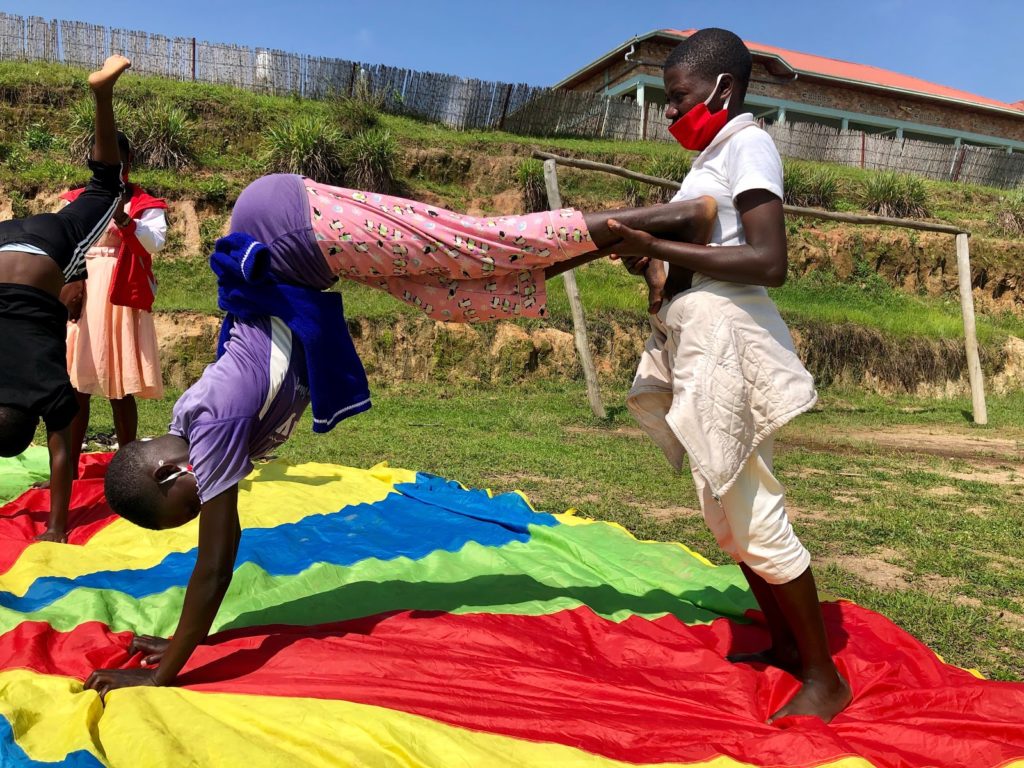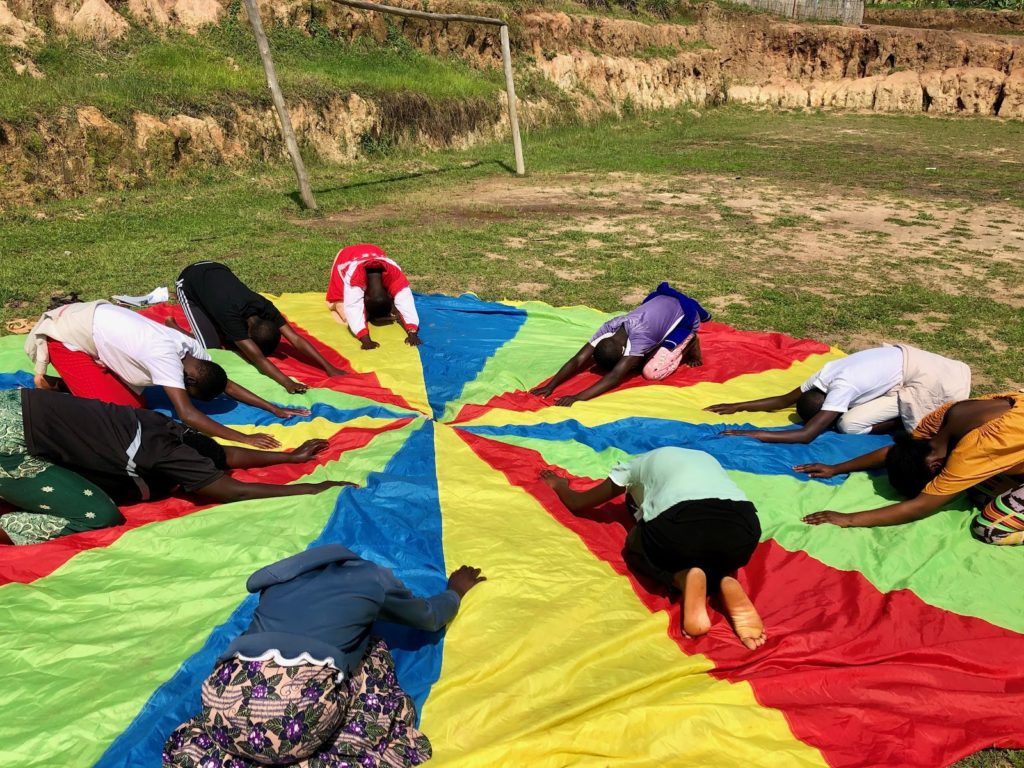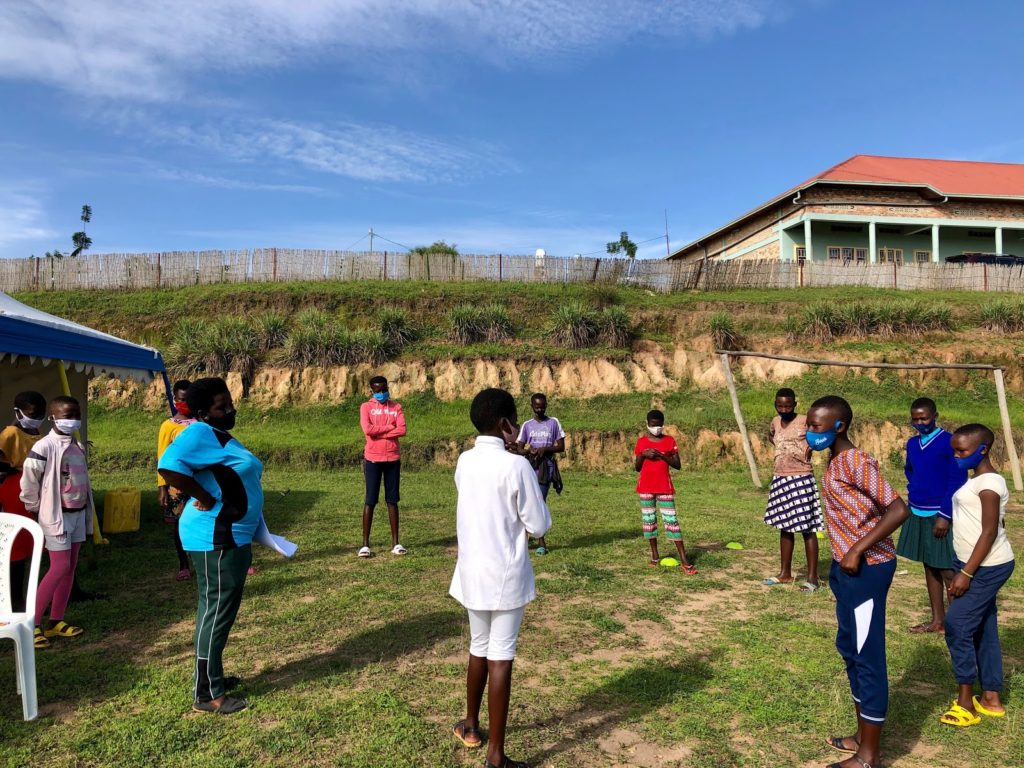Kids Play Rwanda’s final All Girls United Camp of 2020 focused on preventing gender-based violence (GBV). Coaches introduced the theme by noting November 25th is the International Day for the Elimination of Violence Against Women, and kicked off the 16 Days of Activism Against GBV. During Camp, the girls learned how to differentiate between physical, verbal, sexual, psychological, and socio-economic violence, and participated in a variety of activities that debunked myths on the topic and broadened the girls’ knowledge on GBV around the world.
Day One: Knowledge is Key to Ending GBV
Lead coach Claudine welcomed the girls to November AGU Camp with energy and enthusiasm. When she asked why we’re focusing on GBV in November, many girls remembered there is an official day for preventing violence against women during the month.

Q: How do you think you can take action against gender-based violence?
A: I can be a good listener. If I know someone who’s experienced violence, I can give them support and ask KPR to assist as well
The day began with the first activity, Girls Lifting Up Girls. This activity was a great way for the girls to build relationships with their peers. Each girl found a partner (someone they didn’t know well) and interviewed one another for five minutes, focusing on their partner’s strengths. Afterward, each person chose one of their partner’s most memorable attributes and created a keepsake card. This game encouraged the girls to talk with a peer they were less familiar with and open up about their skills and strengths. At the end of the exercise, coaches asked the girls to share with the larger group the card they made for their partner—this was a special moment where each girl could acknowledge what they thought was an admirable trait of their new friend.
The girls then moved on to their second activity, Myth Versus Truth: GBV. This activity was an effective way to start the day, as the coaches could attain a baseline understanding of the girls’ thoughts and beliefs on gender-based violence. Afterwards, coaches concluded that most girls had a general understanding of GBV and can identify harmful gender stereotypes.
Statement: Violence against women/girls is a natural expression of male feelings and cannot be avoided or changed
A: We need to engage more men in this conversation. Those who know about gender equality should teach those who don’t (Emerance Muhayeyesu, 15)
After learning the myths and truths of GBV, the girls began a relaxing activity of Yoga. This was a great opportunity for the girls to showcase their talents, help one another and have a bit of unstructured time with their friends.
Day One concluded with the final activity Gender-Based Violence Around the World. During “Gender-Based Violence Around the World,” the coaches read out short stories pertaining to physical, verbal, sexual, psychological and socio-economic violence from different countries. The coaches had maps, and after reading a particular story from a certain place, they would point it out on the map so that the girls could geographically understand where the country is located. The girls learned something new during this activity, as it seems most didn’t know gender-based violence was widespread.

Day Two: Stand Up, Speak Up
Day Two began with Human Bingo. This was a fun, light, and easy way to start off the day! Each girl received a BINGO sheet, which listed various hobbies/characteristics/traits. The girls had to mingle amongst themselves and find people who matched the description. This was a great way for the girls to bond, learn a bit more about one another, and have some fun before a heavy presentation.
After Bingo, Coach Francoise kicked off day two by briefly reviewing the information from day one. She asked the girls why we are learning about gender-based violence in November (16 Days of Activism) and to explain why activism is important.
Q: Why is activism important?
A: Activism rallies many people for a cause so we can create change.
Activity two featured a Gender and GBV Presentation with Silas from RWAMREC. Silas led two 3-hour presentations—one with girls 13-15 and the other with girls 15-18. He started the presentation off by going over what is gender, how culture shapes gender and gender stereotypes. Afterward, he introduced the concept of gender-based violence and folded in the concept of gender inequality perpetuating such violence. Silas made the day very interactive—he used chart paper to brainstorm with the girls, ensuring he wasn’t “talking at them,” and conducted an activity that got everyone up and moving around.
Silas: Remind me, what is gender?
A: Gender is contrived by society and everyone is expected to follow these guidelines. However, sex is the genetalia we are born with and this cannot change (Francine Uwamahoro, 17)

Overall, the lessons learned during KPR’s final AGU camp increased the girl’s knowledge of GBV. Many of the girls built new friendships through the ice breaker activities and bolstered a solidarity, support, and belonging that will only continue to strengthen in the future.
